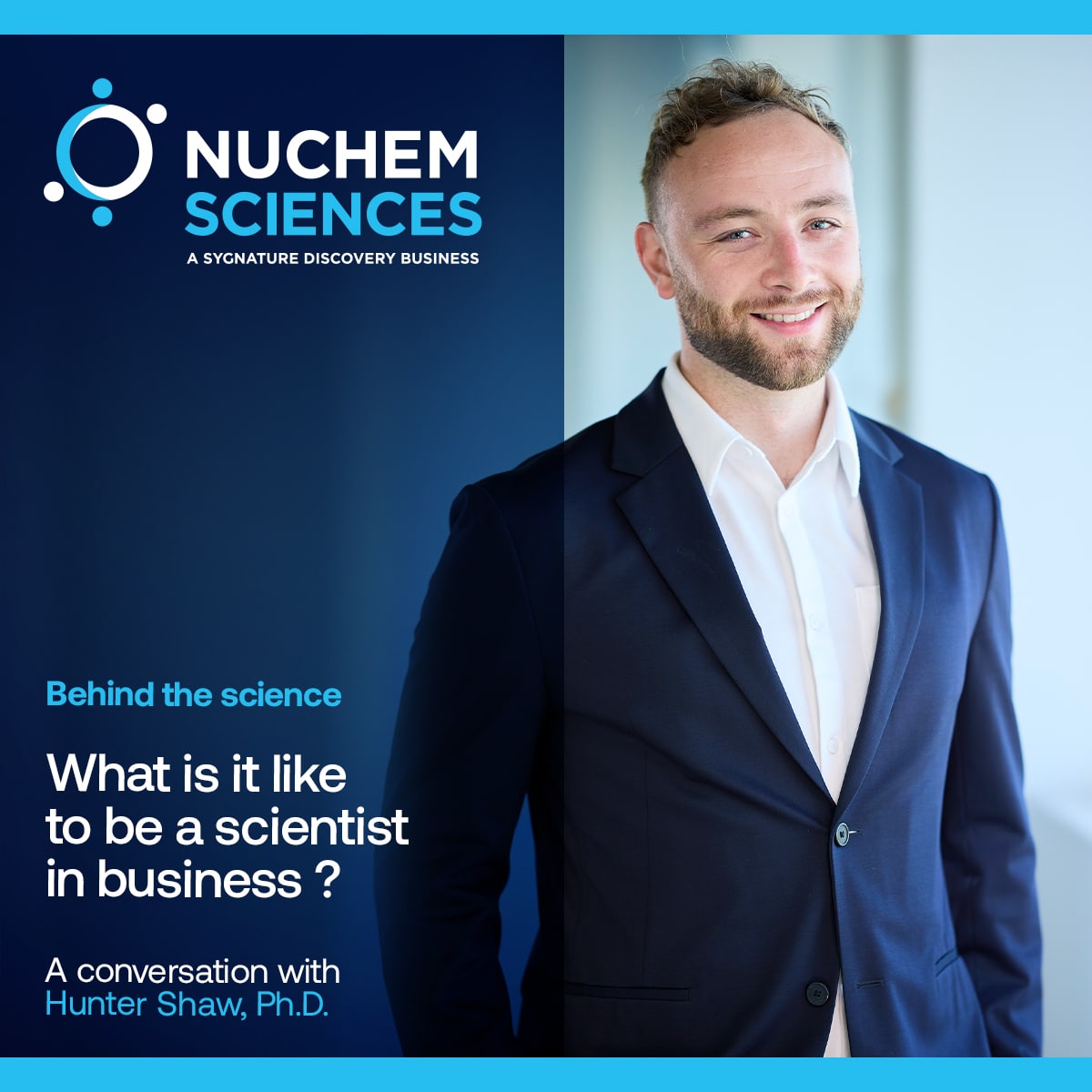What is it like to be a scientist in business?
A conversation with Hunter Shaw, Ph.D.
Growing up on a farm in British Columbia, Hunter Shaw always knew he wanted to be a scientist. This path led him to a Ph.D. in McGill’s Center for Research in Neuroscience, where his work earned three first-author publications and three awards.
As he moves from biology to business development at NuChem Sciences, we ask Hunter about his career successes to date, what lies ahead in the world of drug discovery and what artists and scientists can learn from each other.

First, congratulations on earning the title of Business Development Liaison at NuChem Sciences! What does this new role involve?
It’s very dynamic and a big shift from my previous work with the biology team. I’m completely out of the lab now and haven’t worked in one since February 2021!
The best way to describe my role is being the intermediary between the client and the science. We coordinate the business-related stuff with the finance team, who might not be scientists. Then, we coordinate with the clients, who tend to be scientists and know exactly what they need in terms of the science. There’s a lot of interaction, in addition to understanding the science and helping everything flow together.
In general, I put documents and contracts together, help out with our website and content, and deal with branding. We also recently acquired OmegaChem, so, I interact with them to make sure we’re consistent in terms of our websites and branding.
Did you always want to go into business?
It was a long-term goal. Since I have a background in biology, my understanding is that I was hired to assist the business development team in promoting NuChem Science’s biology services. However, the team wanted to train me in the lab first, so I knew what services they offered.
I was initially supposed to work in the lab for three years, but I was fast-tracked into this role after a year and a half, since the company is growing so fast.
I’m settling into my new role and I’m still learning things on the fly, but Marc Janes (Vice President, Business Development and Innovation at NuChem Sciences) is a really good teacher and I’m surrounded by a really fantastic team. They sit down with me, talk to me and are very open with me. It’s really nice to be surrounded by professionals who have been in the industry for 25 years.
What have you learned since taking on this new role?
I’ve definitely learned a lot about interacting with people. I was fortunate that I grew up playing a lot of team sports, and I regularly think of mistakes I made as a teenager, when you’re young and don’t understand the consequences of your actions or the end goal. So, I’ve learned to implement those lessons in terms of listening to people and gauging what they need of you.
I’ve learned a lot about the industry itself. There’s a lot of moving pieces that keep a company afloat, not just the product you sell. It’s an interesting dynamic that I didn’t really learn in academia, so it’s cool to understand that side of a company.
Does having a pure science background give you an advantage in business? What is the difference between you and someone from a pure business background?
They might be better at business development than me, but they might not have the appreciation or understanding of the science.
They might not have spent seven or eight years in a lab crunching numbers or doing an assay. When I write up a contract, I know the scientists doing the assay, I know the project lead and I know the assays needed. So, I can discuss details with them, or direct a question I have to an expert in that field.
I think that’s my strength and that’s where I fit in at NuChem.
What have been your biggest achievements to date?
Essentially, this is one of my first jobs ever, so I think a lot of achievements are still to come!
I think one of my proudest moments during my Ph.D. was publishing my paper in The Journal of Neuroscience. A sculpture of an image I generated of the fruit fly brain actually made the front cover of the volume, which was amazing! That sculpture was created as part of the Convergence Initiative, a collaboration between neuroscientists at McGill and art students at Concordia that I helped set up. The premise was that artists would take our Ph.D. projects and make art inspired by them. In my case, an artist named Pamela Simard made wood sculptures based on microscopic images I generated.
We realized that artists and scientists are much more similar than we think. There’s a process, a theory and a history to art and science that neither side often understand. I think the initiative summed up that intersection between the two disciplines really nicely.
I have a framed copy of that cover of The Journal of Neuroscience – seeing my work highlighted that way was really exciting.
As someone who has now played two roles in the drug discovery industry, do you feel like you are part of something worthwhile?
Yes. At some point in our lives, we or someone in our lives is going to be affected by a debilitating disease in some way or another – whether it be cancer, neurodegeneration or the likes.
In this job, it feels like you could achieve something great for humanity by finding a treatment for those illnesses. Of course, you hope that the one molecule you find will be the right one. But it adds to the fulfilment.
What do you like most about your job?
My colleagues are amazing – I really love them all. They’re very kind and always willing to help.
Everyone at NuChem Sciences realizes that we all need to succeed together, whereas in grad school you concentrate on your own projects.
I also like interacting with experienced people in the company. Being able to talk with the Chief Scientific Officer is really cool. Our leadership team have been in the industry for a long time, and they take the time to advise me on my career path.
In business development, everyone has been great at showing me what the process is. Scientists might not ever see that, as it often happens behind closed doors. It has been a steep learning curve, but also a really well-rounded experience.
What, do you think, is NuChem’s competitive advantage?
Three things make us stand out: quality, intellect and knowledge.
There is a very high standard for our work, and everyone on our team wants our error bars to be extremely small. These standards aren’t just about providing the best solution to the clients – it’s also about our desire to be the best.
This high standard doesn’t just apply to the experiments we do, but also to the presentation of data and the communication we have with clients. The scientists here are also very knowledgeable in their specific fields.
I consider intellect to be more like problem-solving. If there’s something that’s not working, we’ll always figure it out. Everything we give the client has to be a professional and finalized piece of work.
Do you have a motto or personal mantra?
My motto has always been: “What have I accomplished, what have I contributed?”
I don’t want to leave this planet without having made an impact. I feel very fortunate that I have the abilities that I have, and I really want to live up to my potential.
What advice would you give to a student or young person in your field?
I think the best advice is to communicate with people as much as possible. In this industry, connections are so important.
The biggest thing you can do is talk to people and ask about different things or see what you like and don’t like. People love to be asked about what they do, so don’t be afraid to message them.
The importance of being humble
Hunter’s favorite cinematic moment is in the Spielberg epic Jurassic Park, when Dr. Ian Malcolm says: “Life finds a way.”
“We tend to think that we can control everything, but there is a lot we don’t understand – especially in terms of biology and science,” Hunter says.
“We can only detect things with the tools we currently have. So, scientists have to be humble and open-minded, because something might happen that we can’t always explain!”

Transform Ideas Through Science
A drug discovery and chemical development contract research organization.
News & Events
NuChem Sciences Inc.
2350 Rue Cohen Suite 201
Saint-Laurent, Quebec
Canada H4R 2N6
514 416 5659
